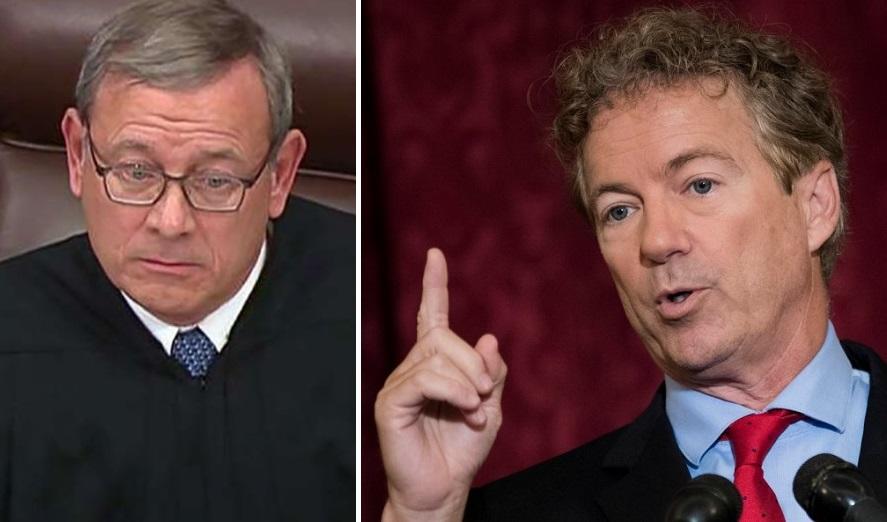Controversy Erupts After Chief Justice Roberts Shuts Down Rand Paul ‘Whistleblower’ Question
Sen. Rand Paul (R-KY) was spitting mad Wednesday night after Chief Justice John Roberts blocked his question concerning the CIA whistleblower at the heart of the impeachment of President Trump.
According to both Politico and The Hill, Roberts told Senators that he wouldn’t read Paul’s question, or any other question which would require him to publicly say the whistleblower’s name or otherwise reveal his identity – which has been widely reported as CIA analyst Eric Ciaramella, who worked for the National Security Council under the Obama and Trump administrations – and who consulted with Rep. Adam Schiff’s (D-CA) staff prior to filing the complaint.
Stunning that Adam Schiff lies to millions of Americans when he says he doesn’t know the identity of the whistleblower.
He absolutely knows the identity of the whistleblower b/c he coordinated with the individual before the whistleblower’s complaint! His staff helped write it!
— Elise Stefanik (@EliseStefanik) January 29, 2020
A frustrated Paul was overheard expressing his frustration on the Senate floor during a break in Wednesday’s proceedings – telling a Republican staffer “If I have to fight for recognition, I will.“
Roberts signaled to GOP senators on Tuesday that he wouldn’t allow the whistleblower’s name to be mentioned during the question-and-answer session that started the next day, the sources. Roberts was allowed to screen senators’ questions before they were submitted for reading on the Senate floor, the sources noted.
Senate Majority Leader Mitch McConnell (R-Ky.) and other top Republicans are also discouraging disclosure of the whistleblower’s identity as well. Paul has submitted at least one question with the name of a person believed to be the whistleblower, although it was rejected. Sen. Mike Lee (R-Utah) composed and asked a question regarding the whistleblower earlier Wednesday that tiptoed around identifying the source who essentially sparked the House impeachment drive. –Politico
“We’ve got members who, as you have already determined I think, have an interest in questions related to the whistleblower,” said Senate Majority Whip John Thune (R-SD), adding “But I suspect that won’t happen. I don’t think that happens. And I guess I would hope it doesn’t.”
That said, Paul says he’s not giving up – telling reporters “It’s still an ongoing process, it may happen tomorrow.”
Does Ciaramella deserve ‘anonymity’?
Of note, Roberts did not offer any legal argument for hiding the whistleblower’s identity – which leads to an interesting argument from Constitutional law expert and impeachment witness Johnathan Turley concerning whistleblower anonymity.
Via Jonathan Turley (emphasis ours)
Federal law does not guarantee anonymity of such whistleblowers in Congress — only protection from retaliation. Conversely, the presiding officer rarely stands in the path of senators seeking clarification or information from the legal teams. Paul could name the whistleblower on the floor without violation federal law. Moreover, the Justice Department offered a compelling analysis that the whistleblower complaint was not in fact covered by the intelligence law (the reason for the delay in reporting the matter to Congress). The Justice Department’s Office of Legal Counsel found that the complaint did not meet the legal definition of “urgent” because it treated the call between Trump and a head of state was if the president were an employee of the intelligence community. The OLC found that the call “does not relate to ‘the funding administration, or operation of an intelligence activity’ under the authority of the Director of National Intelligence . . . As a result, the statute does not require the Director to transmit the complaint to the congressional intelligence committees.” The Council of the Inspectors General on Integrity and EfficiencyCouncil strongly disagree with that reading.
Regardless of the merits of this dispute, Roberts felt that his position allows him to curtail such questions and answers as a matter of general decorum and conduct. It is certainly true that all judges are given some leeway in maintaining basic rules concerning the conduct and comments of participants in such “courts.”
This could lead to a confrontation over the right of senators to seek answers to lawful questions and the authority of the presiding office to maintain basic rules of fairness and decorum. It is not clear what the basis of the Chief Justice’s ruling would be in barring references to the name of the whistleblower if his status as a whistleblower is contested and federal law does not protect his name. Yet, there are many things that are not prohibited by law but still proscribed by courts. This issue however goes to the fact-finding interests of a senator who must cast a vote on impeachment. Unless Majority Leader Mitch McConnell can defuse the situation, this afternoon could force Roberts into a formal decision with considerable importance for this and future trials.
Tyler Durden
Thu, 01/30/2020 – 11:25
via ZeroHedge News https://ift.tt/3aUnPD5 Tyler Durden
